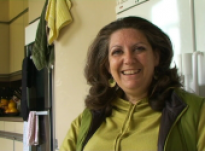Linda - Interview 13

More about me...
Linda was hospitalised when she was 15 and eventually diagnosed with Crohn’s Disease. She was put on medication and has managed to largely control any flare ups through bed rest and the occasional course of steroids. For Linda, Crohn’s hasn’t greatly affected her life but has always been a part of it and she wonders whether her decision to work from home in a self employed capacity is related to the difficulties Crohn’s can cause. Now she has reached her fifties, Linda is more accepting of her Crohn’s but also self aware of the possible side effects of the long term medication.
Linda realises that she probably chose to be self-employed because it was 'safer' in terms of having to take time off.
Linda realises that she probably chose to be self-employed because it was 'safer' in terms of having to take time off.
I think that subconsciously the choice of work that I’ve done, low key, administrative business stuff, and then when the opportunity to work for myself at home came up 23, 24 years ago, it, that I’m sure that was part of my decision to do it, that it’s safer somehow. Working for myself, the thought of being ill and having to take regular time off from an employer, you know, the diffi… yes, I have worked outside the home and I’ve had full time employment, you know, but I think that running my own business where I have control over when I work was definitely part of having Crohn's Disease.
Linda's not convinced that the Jewish diet is a factor in Crohn's disease.
Linda's not convinced that the Jewish diet is a factor in Crohn's disease.
As a young adult, Linda found being unable to eat normally, chronic diarrhoea and weight loss hard to deal with.
As a young adult, Linda found being unable to eat normally, chronic diarrhoea and weight loss hard to deal with.
Linda doesn't like to think of herself as an ill person. Her Crohn's is more under control these days but she still likes to know where the toilets are.
Linda doesn't like to think of herself as an ill person. Her Crohn's is more under control these days but she still likes to know where the toilets are.
The real issue is the… needing to be near a toilet all the time. That is, that can be a problem. And there are other socially unacceptable symptoms, which, you know, at its worst means you really don’t feel much like going out. But it hasn’t happened to me like that for a long time, because the medication I take now, which is non steroidal, it seems to work. But if I did get a flare up I know, you know, that it’s just a case of popping some extra pills and within, as I say, a pretty short time, it’s, it would be back under control. So I might lose a day’s work, may be two.


